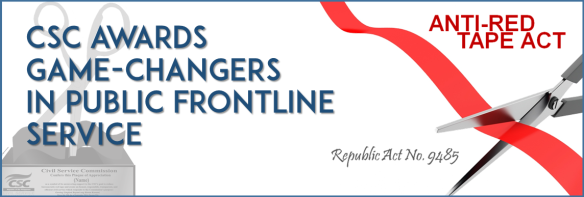“Good news,” says Civil Service Commission (CSC) Chairman Francisco T. Duque III of the results of the 2013 Anti-Red Tape Act (ARTA) Report Card Survey (RCS) which was released last month.
Majority of the service offices surveyed passed, with 18 percent of the total 929 offices surveyed getting an Excellent rating and only 67 service offices or 7 percent failed.
Five hundred fifty seven or 60 percent rated Good; and the remaining 101 offices or 11 percent, Acceptable.
“We have seen a significant improvement in the passers,” said Chairman Duque.
Duque also believes that the significant improvement could mean that agencies now see that the provisions of the ARTA are for the improvement of their frontline services.
In addition to this, with the random spot checks, dubbed ARTA Watch, which the CSC conducts from time to time, as well as the annual Report Card Survey, agencies are on high alert as the CSC strictly implements the Anti-Red Tape Act.
The evaluation of frontline services of government offices is done through the RCS, a component of Republic Act No. 9485, also known as the Anti-Red Tape Act of 2007, to obtain evidence-based feedback on existence and effectiveness, as well as compliance with the agency Citizen’s Charter.
The Charter contains the types of frontline services a government agency offers with the step-by-step procedure, the person responsible for each step, time needed to transact, documents required, and fees. It is posted in conspicuous areas to make government transaction easier and transparent to the public.
“The ARTA RCS is not a perceptions survey. The survey is conducted face to face with clients who have just availed of any frontline service of the office being inspected,” explains Chairman Duque.
A service office fails the RCS when it incurs a final score that is below 70, or if it fails in one of the two core areas of ARTA.
Core 1 or compliance with ARTA provisions checks if the frontline office has a Citizen’s Charter visible to transacting clients and an anti-fixing campaign, if frontline staff wear identification cards, if there are no hidden transaction costs, if there is a manned Public Assistance and Complaints Desk, and if the frontline unit observes the No Noon Break policy.
Core 2 or overall client satisfaction checks the frontline service provider, service quality, physical setup, basic facilities, and respondent-client satisfaction.
Offices which obtained a score of 90 to 100 are rated Excellent; 80 to 89.99 Good; 70-79.99 Acceptable.
Service offices that failed the RCS will undergo the Service Delivery Excellence Program (SDEP), to be conducted by the Civil Service Commission, to determine and address problem areas in frontline service delivery.
“As the bureaucracy’s human resource institution, the CSC takes a developmental stance in implementing the ARTA. More than informing the public which offices passed or failed the annual ARTA Report Card Survey, the Commission provides various HR and organization development training programs that will aid government agencies to improve their service delivery,” said Chairman Duque.n
CSC News Release
March 12, 2014













